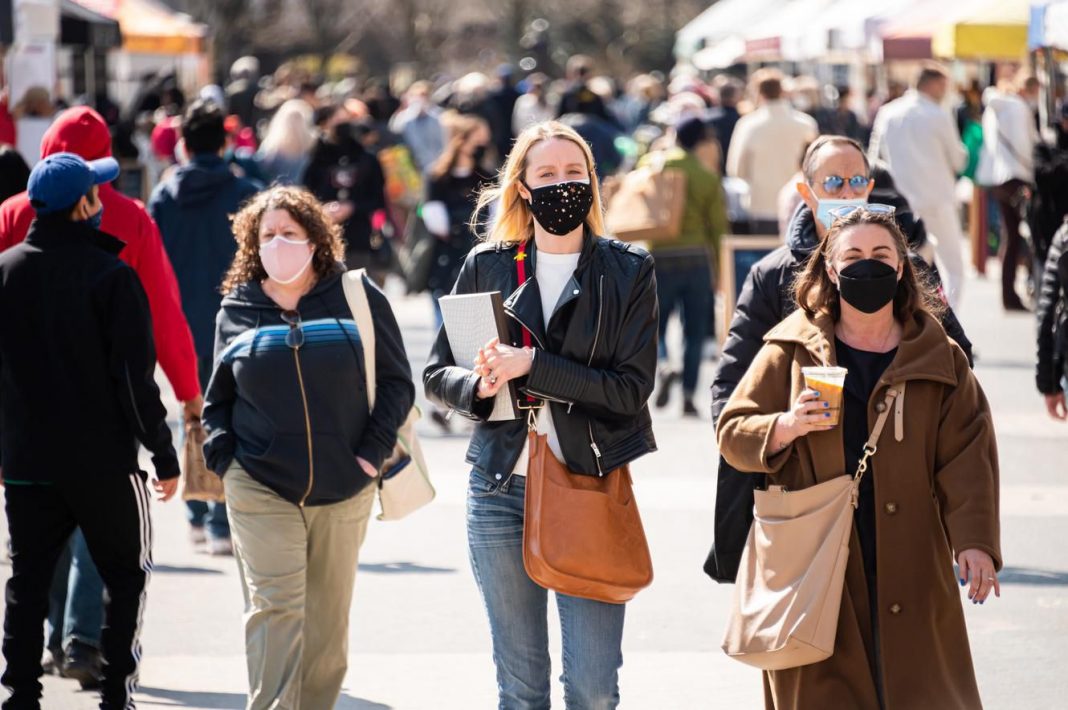
One year into the Covid-19 pandemic, despite over half a million deaths, many people still are … [+]
Getty Images
It’s now been one year or roughly 12 missed haircuts since the World Health Organization (WHO) declared the Covid-19 coronavirus outbreak a pandemic. And oh bleep what a year it’s been.
As I covered a year ago for Forbes, March 11, 2020, was the day that the WHO had officially determined that transmission of the severe acute respiratory syndrome coronavirus 2 (SARS-CoV2) was occurring simultaneously worldwide. Of course, this declaration was about as surprising as a marriage from the reality TV show The Bachelor falling apart. Ever since the WHO had labeled the Covid-19 coronavirus outbreak as a Public Health Emergency of International Concern (PHEIC) on January 30, 2020, the virus continued to spread from country to country. When countries like the U.S. didn’t take a very contagious virus like the SARS-CoV2 very seriously and didn’t employ aggressive measures to contain the virus, take a wild guess as to what ended up happening. The virus continued to spread. And spread and spread. By the end of February, it seemed only a matter of time before the epidemic would become a pandemic.
Things certainly didn’t get better in the U.S. after March 11, 2020. Some countries like South Korea, Taiwan, and New Zealand implemented organized, coordinated science-based national responses to controlling the spread of the virus. Meanwhile, the U.S.’s response was about as consistent as relationships on the reality TV show Temptation Island. The leaders of the U.S. government flip-flopped between warning the public about the virus and claiming that the virus would go away and that the country was “rounding the corner” on the pandemic. In the year since the pandemic was declared, then U.S. President and now Mar-A-Lago resident Donald Trump decided to pull the U.S. out of the World Health Organization (WHO), wondered aloud whether you could inject disinfectant, repeatedly passed along responsibility for handling the pandemic to the States, and actually seemed to listen to advice about the pandemic from a guy who sells pillows, among other things. The national response was about as organized as a ferret dance party.
It’s not surprising that such a response to the pandemic or lack thereof had its consequences. And, in this case, consequences doesn’t just mean people wearing pajama pants to business meetings and getting used to saying, “hey, you’re on mute! We can’t hear you! Press the unmute button!” As of March 11, 2021, according to the Johns Hopkins University Coronavirus Resource Center, the Covid-19 coronavirus has resulted in over 118.0 million reported Covid-19 cases and over 2.6 million deaths worldwide. The U.S. has had by far the most reported Covid-19 cases with over 29.1 million and the most reported Covid-19 deaths at over 529,000. India has had second most reported Covid-19 cases (over 11.2 million) followed by Brazil (over 11.2 million), Russia (over 4.3 million) and the United Kingdom (over 4.2 million). The U.S. has had nearly twice as many reported Covid-19-related deaths as second-place Brazil (over 270,000). Mexico follows with over 192,000 deaths with India fourth at over 158,000 and the U.K. fifth at over 125,000. Compare these numbers with those from South Korea (1,652 deaths), Australia (909 deaths), New Zealand (29 deaths), and Taiwan (10 deaths).

Science-based responses to the pandemic have helped Taiwan control the Covid-19 coronavirus much … [+]
Anadolu Agency via Getty Images
According to Erin Banco, reporting for POLITICO, an upcoming issue in the Centers of Disease Control and Prevention (CDC) Morbidity and Mortality Weekly Report will show that the U.S. death rate increased by 15 percent in 2020. This meant that last year was the deadliest year in recorded U.S. history, and Covid-19 was the third leading cause of death in the U.S., trailing only heart disease and cancer. As a result, life expectancy in the U.S. fell a full year, from 78.8 years in 2019 to 77.8 years in 2020. All of this happened while some continued to claim that the Covid-19 coronavirus was no worse than the flu or even the common cold. All of this happened while political leaders continued to push against Covid-19 precautions without offering viable alternatives. All of this happened while a number of people refused to wear face masks, treating wearing masks like wearing porcupines on their faces.
The first year of the Covid-19 coronavirus pandemic may forever be known as the year the U.S. paid a hefty price for not listening to science. It’s also a year that America was delivered yet another harsh warning to change its ways. Over the years, science has been taking more and more of a back seat in American society to the point of being seemingly relegated to the trunk of many policy-making discussions. After all, how many actual scientists can the average American name that don’t have names that rhyme with “ouchie?” In the words of the 2003 movie, “Something’s Gotta Give.” Consider this pandemic as a trip to the emergency room for chest pain, a warning of worse things to come should drastic changes not be made. It is a warning that should be heeded. Otherwise, a half a million deaths, as tragic as it may be, may be simply the beginning of even worse things to come.









